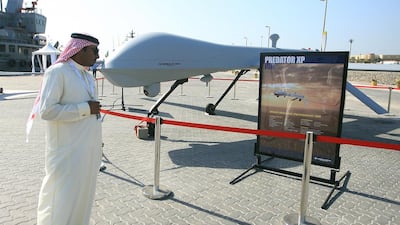NEW YORK // The sale of Predator surveillance drones to the UAE has been tentatively approved by senior US lawmakers, in what would be the first sale of the aircraft outside of Nato.
After nearly two years of deliberations, the US state department began talks with the senate and house foreign affairs committees in December, both of which approved the sale by defence contractor General Atomics to the UAE last week, US officials told Bloomberg News yesterday.
Congress is expected to be officially notified this week, with legislators then having 30 days to block the sale.
A source familiar with the discussions on Capitol Hill said that members of both the foreign affairs committees do not foresee any problems.
After the 30-day deadline expires, the state department will be free to clear the sale – which is worth around US$200 million (Dh734.6m), according to a Congressional Research Service report.
The sale of the unarmed export version of the military drone was announced at the Idex defence trade show in Abu Dhabi in February 2013. Sources familiar with the deal say it includes up to 10 Predator XP drones equipped with surveillance and targeting equipment but no weapons capabilities.
“The sale reflects the increasing closeness between the US and the UAE,” said Bilal Saab, a senior fellow for Middle East security at the Atlantic Council think tank in Washington, “the latter being perceived by the former as its most competent and trusted partner in the Arab world.”
If Congress allows the sale to proceed, General Atomics and the UAE would then complete the deal. The UAE ambassador to Washington, Yousef Al Otaiba, told Bloomberg Government earlier this month: “We then have to go back in and find funds, because this contract was signed two years ago” but that “It should be approved within the next several months.”
With the agreement signalling the first ever sale of the sophisticated technology to a nation outside of Nato, the US defence, state and commerce departments had to coordinate on formulating new policy to enable the deal.
A major stumbling block was Washington’s legal obligation to maintain Israel’s “qualitative military edge” over all other countries in the region. Similar concerns had to be addressed before the sale of advanced F-16 fighter jets to the UAE.
Many US allies in the Gulf and elsewhere have expressed interest in buying the Predator technology, which is now seen as a strategic asset. China, Turkey, Pakistan and other countries are developing similar technology, and concerns have been raised that they may have less qualms than the United States in exporting armed drones.
The UAE is one of the closest US allies in the Middle East. Between 2007 and 2010, the UAE signed defence contracts with US firms worth more than $10 billion, and contracts for military systems and training worth at least another $10bn have been agreed to since then. Many of these purchases have been made with a focus on defending against Iranian missile capabilities.
tkhan@thenational.ae

